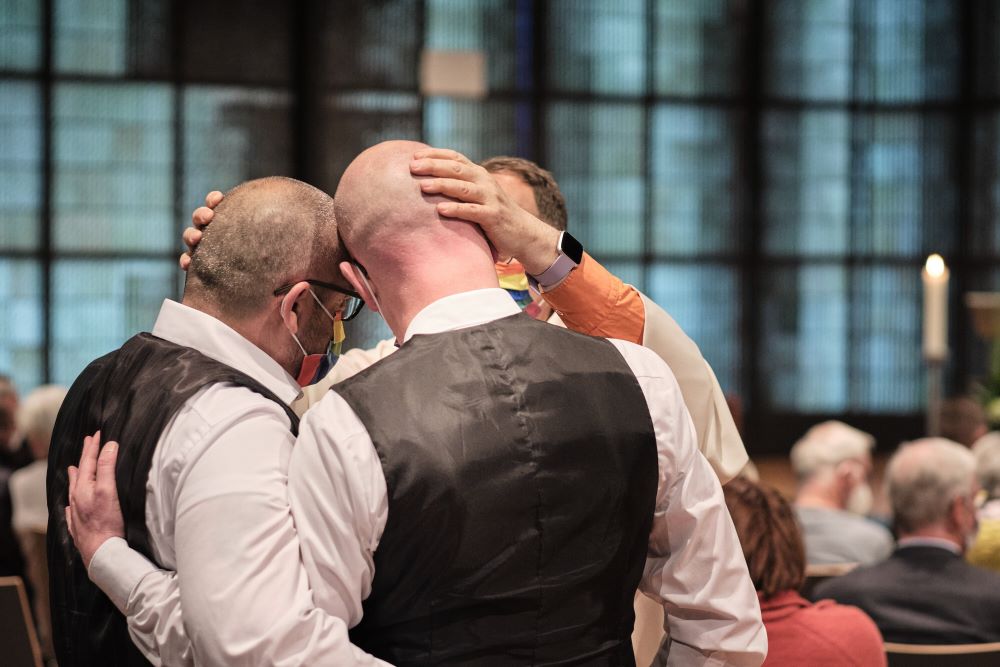
Fr. Heiner Dresen blesses a same-sex couple in Geldern, Germany, on May 6, 2021. On Dec. 18, the Vatican released a declaration on the possibility of blessing couples in irregular and same-sex unions. The policy does not in any way change the church's perennial teaching on marriage, officials have said. (OSV News/KNA/Rudolf Wichert)
While the whole world was preparing to celebrate the birth of the King of Peace, Pope Francis disturbed the world by releasing the document, "Fiducia Supplicans, On the Pastoral Meaning of Blessings." In approving this declaration from the Dicastery of the Doctrine of the Faith, or the DDF, Francis allows priests to bless divorced individuals, people in same-sex relationships and civilly remarried couples.
In a revolutionary breakthrough and with Francis' approval, the Vatican announced that "Roman Catholic priests can administer blessings to same-sex couples as long as they are not part of regular Church rituals or liturgies." He further stated that priests "should not prevent or prohibit the Church's closeness to people in every situation in which they might seek God's help through a simple blessing."
After reading this news, I was reminded of this feminist saying: "Men of quality are not afraid of equality."
Pope Francis' gesture of inclusivity spoke loudest about the true meaning of synodality: listening. His availability to listen is an art that can heal a human heart. He has started weaving together the People of God by listening to every member of the church to understand, as God might be speaking and listening to every creature.
By his very act of blessing couples in same-sex relationships, Pope Francis has heard the clamor of the poor and marginalized.
He listened to priests and nuns working toward acceptance of LGBTQIA people — those who are lesbian, gay, bisexual, transgender, queer/questioning, intersex or asexual. This is a tangible sign of Pope Francis' courage in welcoming the chastised faithful that the church has long lost. His courage will serve as a catalyst for more social change.
Francis' salutary efforts are perhaps misunderstood by the conservatives. Is he building his own church? Of course not. At the same time, of course he is. He is revisiting the vision of Vatican II, which envisaged the new church as the "magisterium of the poor'" at the margins.
The renowned theologian and Sri Lankan Jesuit Fr. Aloysius Pieris made a similar point in his 2019 book, Helping Francis Renew the Church, "This Pope is doing nothing new. His vision-cum-mission is the implementation of Vatican II’s mandate to trigger a non-stop process of spiritual and pastoral renewal of the church, as dictated by the spirit of the Gospel of Jesus, Pieris wrote.
Francis. he continued, "is determined to remove the theological barrier that has distanced the Magisterium from the masses, the class barrier that separated Shepherds from the Sheep, the language barrier that stood between the Church and the World, and the barrier of bias that obstructs both ecumenism and inter-religious collaboration."
In my understanding, the consecrated one (prophet) comes to this planet with a clear vision, the ability to announce that vision effectively both to the powerful and to the people at the margins, and is ready to pay the price. In simple words, Pope Francis is relaunching the pastoral and spiritual renewal of the church, which was envisioned by Vatican II. Pope Francis’s courage is seen in redeeming the failed theology which, according to Pieris, is "pastorally unproductive and spiritually sterile."
By his very act of blessing couples in same-sex relationships, Pope Francis has heard the clamor of the poor and marginalized. His evangelical approach is definitely toward bringing back the Christ-centered, kinship-centered church rather than power-centered and mammon-controlled one.
Advertisement
Francis' steadfastness is in recognition of the Cosmic Christ, pervading the entire universe, envisaging everything as consecrated, which was envisioned by 14th-century St. Catherine of Siena, who said, "All has been consecrated. The creatures in the forest know this, the earth does, the seas do, the clouds know, as does the heart full of love. Strange! A priest would rob us of this knowledge and then empower himself with the ability to make holy what already was."
Just as fear has no value in itself, so courage has no moral value in itself. There is amoral courage: malicious rogues, extremists, assassins. If I have to add an adjective to pope's courage, I would add it as moral courage. Jesus, the prophet par excellence, proclaims that the time is now — time for the reign of God. Now is the time to heed the call of courage.
Since I joined religious life, for every great occasion I have heard a song: "It takes courage to be true." Lyrics from that song are relevant here:
It takes courage to answer a call.
It takes courage to give your all.
It takes courage to risk your name ...
It takes courage to dare- what no one will dare.
To be standing alone and ready to stake for another one's sake, it takes courage …
At this time, as the church is going through turbulent times, through his consecrated courage, Pope Francis emboldens many people to take courage to speak the truth to the powers that be. This courage, which is born out of compassion and obedience to God only, is contagious. There is true courage in willingly choosing to risk one's name and reputation. Francis' act of courage will never cease to inspire ethical resistance to injustice ushering in our new era, which will be known as a movement in hope.







